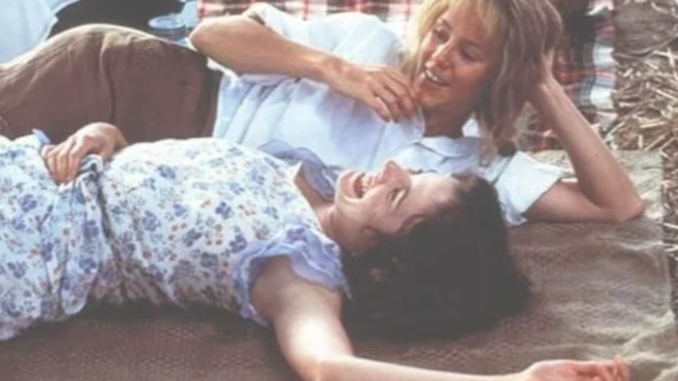
The Beloved Novel
Fannie Flagg’s Fried Green Tomatoes at the Whistle Stop Cafe is a cherished novel that transitions seamlessly between past and present. It tells the story of Evelyn Couch, who befriends Ninny Threadgoode at a nursing home. Through Ninny’s recollections, readers are introduced to the deep love story between Imogene “Idgie” Threadgoode and Ruth Jamison.
Idgie, a tomboy with a rebellious spirit, meets Ruth, and their bond grows into a heartfelt romantic relationship. This connection is the emotional core of the novel, emphasizing themes of love, resilience, and defying societal norms. The novel portrays Idgie as a suitor for Ruth’s affection, making it a heartfelt lesbian love story.
Film Adaptation: Subtle Yet Impactful
The 1991 film adaptation, Fried Green Tomatoes, while beloved, toned down the romantic aspects of Idgie and Ruth’s relationship, presenting them as best friends. Despite this, the chemistry between Mary Stuart Masterson (Idgie) and Mary-Louise Parker (Ruth) is undeniable. Key scenes, such as the playful food fight, symbolize their deep affection and hint at a romantic connection.

Themes of Love and Courage
The film introduces Ruth’s abusive marriage to Frank Bennett, and Idgie’s heroic efforts to rescue her, underscoring their profound bond. Together, they open The Whistle Stop Café, creating a life filled with laughter, love, and drama. Although the film does not explicitly portray their lesbian relationship, the underlying chemistry and emotional depth remain.

While the film’s subtle approach to their relationship may disappoint some, it still resonates with viewers who see the love between Idgie and Ruth. Their story emphasizes the importance of representation and the enduring power of love. The narrative of Idgie and Ruth continues to inspire, showcasing a timeless love story between two extraordinary women.
Was the Film’s Lesbian Erasure Successful?
While Fried Green Tomatoes is a remarkable film, it falls short in portraying Idgie as Ruth’s suitor and fails to depict them as lovers, effectively erasing their lesbian relationship. However, this erasure isn’t entirely successful. Despite Ruth calling Idgie her best friend, their flirtatious chemistry permeates each scene, especially during the symbolic food fight, which many interpret as symbolic love-making.
Their interactions convey a romantic connection. Ruth ignores Grady Kilgore’s advances, focusing solely on Idgie, and vice versa. This dynamic often highlights societal misunderstandings about lesbian relationships.

Idgie even admits that her life is perfect with Ruth. Sadly, Ruth eventually succumbs to cancer, but their love remains evident. Idgie’s continued visits to Ruth’s grave, leaving a jar of honey and a card, symbolize their enduring bond.

While the film’s approach to their relationship may be subtle, it resonates with viewers who see the love between Idgie and Ruth. Their story emphasizes the importance of representation and the enduring power of love, showcasing a timeless love story between two extraordinary women.

Leave a Reply